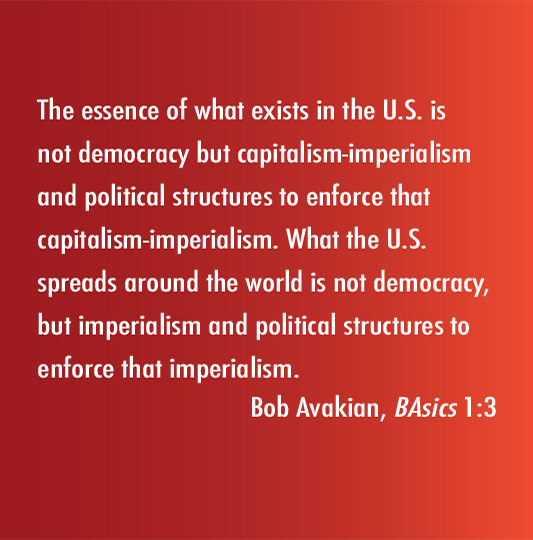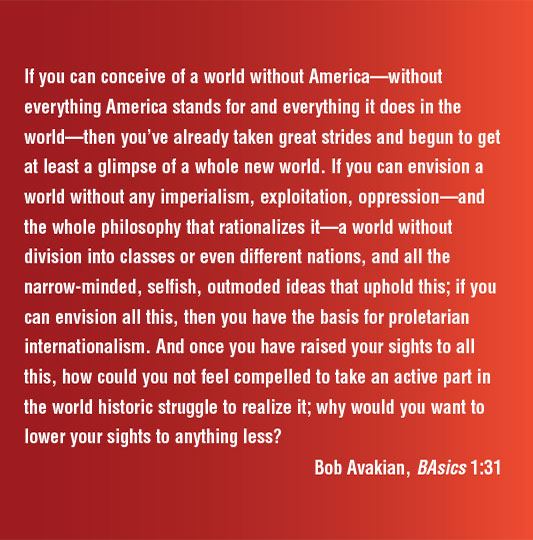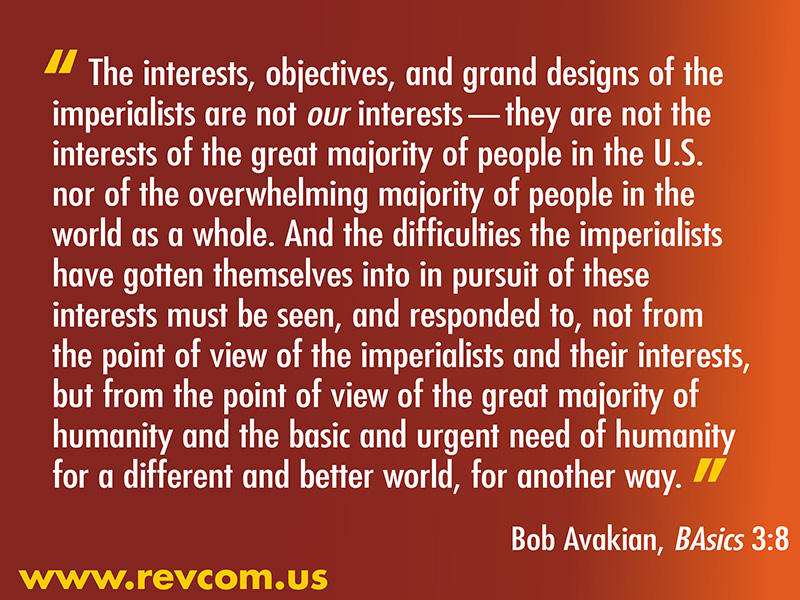With U.S. Ally Saudi Arabia in the News for Assassinating Dissident Journalist Jamal Khashoggi
Test Your Knowledge With the “But That’s Not Who We Are” Quiz
Answers and Sources
| Revolution Newspaper | revcom.us
I. 1.
Answer: c. From the 1500s on into the 20th century, most of the Middle East was controlled by the Ottoman Empire centered in what is now Turkey. In 1908, oil was discovered in the region and it became the intense focus of the U.S. and of various European empires. During World War I (1914-1918), the British encouraged an Arab revolt against the Ottomans, but then when the Ottoman Empire was defeated, the British betrayed that revolt. In the secret Sykes-Picot Agreement (1916), Britain and France carved up much of the region between them based on their respective military strength, and without regard for the wishes or national sentiments of the various populations1. This led to the formation of the modern nations of Iraq, Syria, Lebanon and Jordan. The imperialists then used existing religious and ethnic conflicts to divide and conquer, in order to maintain control of their colonies.2 Later (1948), the state of Israel was established as an even more effective vehicle for control (see question III-1, below).
Since then, the U.S. and Russia have elbowed their way in, with the U.S. being the main power since the 1960s. And while other factors (national and religious rivalries, geography, etc.) certainly played a role in developments, the basic framework is set by the domination of imperialist powers, their extraction of wealth from the region, and their rivalries amongst each other3.
I. 2.
Answer: e. For hundreds of years a variety of tribal groups occupied the Saudi peninsula with no central state. In the wake of World War 1, the forerunners of the House of Saud waged war on the other groups to consolidate power, forging an alliance with the British Empire to do so4. Near the end of World War 2 (February 1945), the King of Saudi Arabia met with U.S. President Roosevelt—now clearly the rising imperialist power in the world—and agreed to provide oil to the U.S. in exchange for U.S. protection of his regime. This deal (which remains in effect today) essentially sealed Saudi Arabia’s position as a U.S. neo-colony. The main beneficiary of this has been the U.S., which not only has made hundreds of billions of dollars from Saudi oil, but has used its control of the peninsula and of Saudi oil as a key strategic resource for dominating the Middle East as a whole and in contending with other imperialist powers.
While the Saudi ruling class and upper strata has grown quite wealthy from this arrangement, large sections of people remain bitterly impoverished—in particular the millions of foreign workers brought in to work in agriculture, oil fields and other industry or as domestic servants to the Saudi elite5. Rivalries also wrack the ruling class itself, leading to a number of violent clashes over the years. Women have no rights, and even Muslims who differ from the extreme Wahhabist6 beliefs of the rulers suffer terrible persecution. The whole political, social and economic structure of Saudi Arabia is extremely brittle, and would not survive long without the solid backing of the U.S. (or some other imperialist power).
II. 1.
Answer: b. On May 2, 1996, on 60 Minutes, Leslie Stahl said that half a million Iraqi children had died as a result of U.S. sanctions against Iraq (aimed at forcing Saddam Hussein to be more compliant with U.S. interests in the region). She asked Albright if the political objectives were worth the lives of all those children, Albright said, “this is a very hard choice, but the price—we think the price is worth it.”
In July 2012, President Obama awarded Albright the “Medal of Freedom.”
II. 2.
Answer to a: False. The U.S. not only failed to denounce these horrendous acts of repression, but even refused to refer to the Egyptian military takeover as a “coup,” because using that word would, under U.S. law, require it to cut off aid. Egypt remained a close U.S. ally under Obama and now Trump.
Answer to b: False. The U.S. government ignores, and the U.S. media essentially buries, all news about the barbaric Saudi regime, and (as we have seen) maintains an extremely close relationship with it.
III. 1.
Answer: e. Israel was conceived as an outpost of European imperialism to dominate the Middle East and has played that role ever since. It was created by the violent ethnic cleansing of nearly a million Palestinians carried out through deceit, terror and massacre. And over time, the oppression of Palestinians has grown more severe, now tending in a genocidal direction.
IV. 1.
Answer: c. Saudi Arabia is one of the most repressive states in the world. In an op-ed in the Guardian newspaper written over a month before Khashoggi’s murder, and while prominent liberal pundits like the New York Times’ Thomas Friedman were still singing the praises of MBS, Kenan Malik pointed to the case of five Saudi activists facing possible execution for “participating in protests,” “chanting slogans hostile to the regime,” and “filming protests and publishing on social media.” Malik cited a UN report on the “pattern of widespread and systematic arbitrary arrests and detention.” Malik noted that for the West, “the regime’s refusal to countenance any dissent has until now created a relatively stable state that is also pro-western,” a “bulwark” against radical movements or contending imperialist powers in the region.
Amnesty International reports that torture is widely used to extract confessions, which are then used to justify executing hundreds of dissidents. Amnesty also notes that Saudi women “are required to have the permission from a male guardian … to enroll in higher education, seek employment, marry or travel.” The right of some women to drive has been granted, but women activists who had campaigned for this are still being threatened and arrested. In the 2000s, women who had been raped but were unable to prove it were subjected to being flogged for “adultery.” In 2014, a Saudi blogger received 1,000 lashes and 10 years in prison for “apostasy”—i.e., departing in some way from Islamic belief.
None of this or the countless other atrocities of the regime have received any significant attention in the Western media, or in any way affected the 70-year-long extremely close relationship between the U.S. and Saudi Arabia.
IV. 2.
Answer: d. There is no evidence of any Iranian troops in Yemen. When Saudi Arabia launched its invasion of Yemen in 2015, their concern was that indigenous Houthi rebels who had taken over most of the country were “influenced” by Iran. There have been allegations—thus far unproven—that Iran has sent a small amount of weapons and advisers to help the Houthi.
IV. 3.
Answer: e. While the Obama administration was “unenthusiastic” about the war in Yemen, according to an Obama official cited by The Atlantic, their attitude was that “Yemen would be a ‘shit show’ whatever the United States does. So why further degrade a sometimes-unpleasant, but necessary relationship with the Saudis to produce the same end result?”
For more on all of this, go to www.revcom.us.
1. The New Yorker refers to Sykes-Picot as a “colonial carve-up" and notes that “Its map ignored local identities and political preferences. Borders were determined with a ruler—arbitrarily. At a briefing for Britain’s Prime Minister H. H. Asquith, in 1915, Sykes famously explained, “I should like to draw a line from the ‘E’ in Acre to the last ‘K’ in Kirkuk.” [back]
2. A British report in this period stated that “What we want … is not a United Arabia, but a weak and disunited Arabia, split up into little principalities so far as possible under our suzerainty – but incapable of coordinated action against us, forming a buffer against the Powers in the West.” See “How Britain Carved Up the Middle East and Helped Create Saudi Arabia, by Mark Curtis. [back]
3. For instance, in 2007, after the U.S. invaded Iraq and incited rivalries between Shiites and Sunnis as a way of consolidating power, NPR’s Morning Edition noted that “Although the origins of the Sunni-Shiite split [in the 7th century] were violent, over the centuries Shiites and Sunnis lived peacefully together for long periods of time…”, but now, “that appears to be giving way to a new period of spreading conflict in the Middle East between Shiites and Sunnis.” [back]
4. Curtis notes that Britain “provided arms and money to Ibn Saud during the First World War, signing a treaty with him in 1915 and recognising him as the ruler of the Nejd province under British protection. By the end of the war, he was receiving a British subsidy of £5,000 a month” He then cites Said Aburish’s vivid description of Ibn Saud’s rise to power a few years later:
Ibn Saud’s “…‘savagery wreaked havoc across Arabia’, terrorising and mercilessly slaughtering his enemies. The conquest of Arabia cost the lives of around 400,000 people, since Saud’s forces did not take prisoners; over a million people fled to neighbouring countries. Numerous rebellions against the House of Saud subsequently took place, each put down in ‘mass killings of mostly innocent victims, including women and children.’ By the mid-1920s most of Arabia had been subdued, 40,000 people had been publicly executed and some 350,000 had had limbs amputated; the territory was divided into districts under the control of Saud’s relatives, a situation which largely prevails today.
“The British recognised Ibn Saud’s control of Arabia, and by 1922 his subsidy was raised to £100,000 a year by Colonial Secretary Winston Churchill.” [back]
5. In 2012, 66 percent of jobs in Saudi Arabia were done by an estimated eight million foreign workers who generally must surrender their visas to their employers, and who have virtually no legal rights. According to the Guardian, there are about 1.5 million foreign maids, many of whom “face intense exploitation and abuse, ranging from months of hard work without pay to physical violence to slavery-like conditions.” In 2013, at least 45 maids were on death row for “crimes” such as “sorcery,” “adultery” or “fornication”—charges often brought when domestic workers report having been raped by their employers. [back]
6. Wahhabism is an extremely strict form of Islam started by Mohammed ibn Abdul Wahhab in the 1700s, and brought to national power in Saudi Arabia with the ascension of the house of Saud in the 1920s. It demands severe punishments—including death—for any deviation from its interpretation of Islam, or for lack of loyalty to the King (or the Caliphate, if one exists). [back]


Clip: "Free Yourself from the GTF!"
From: The Trump/Pence Regime Must Go! In the Name of Humanity, We REFUSE To Accept a Fascist America, A Better World IS Possible, A Talk by Bob Avakian

Get a free email subscription to revcom.us:

